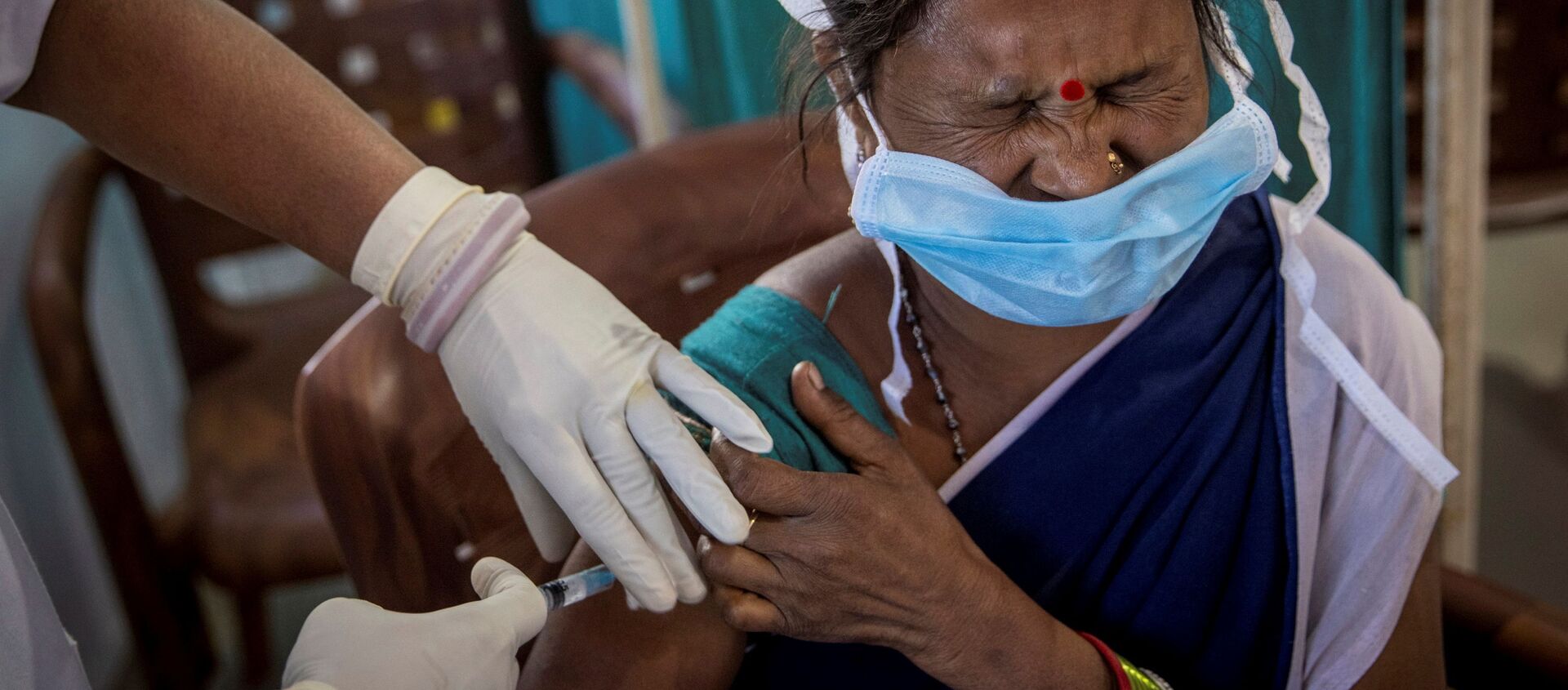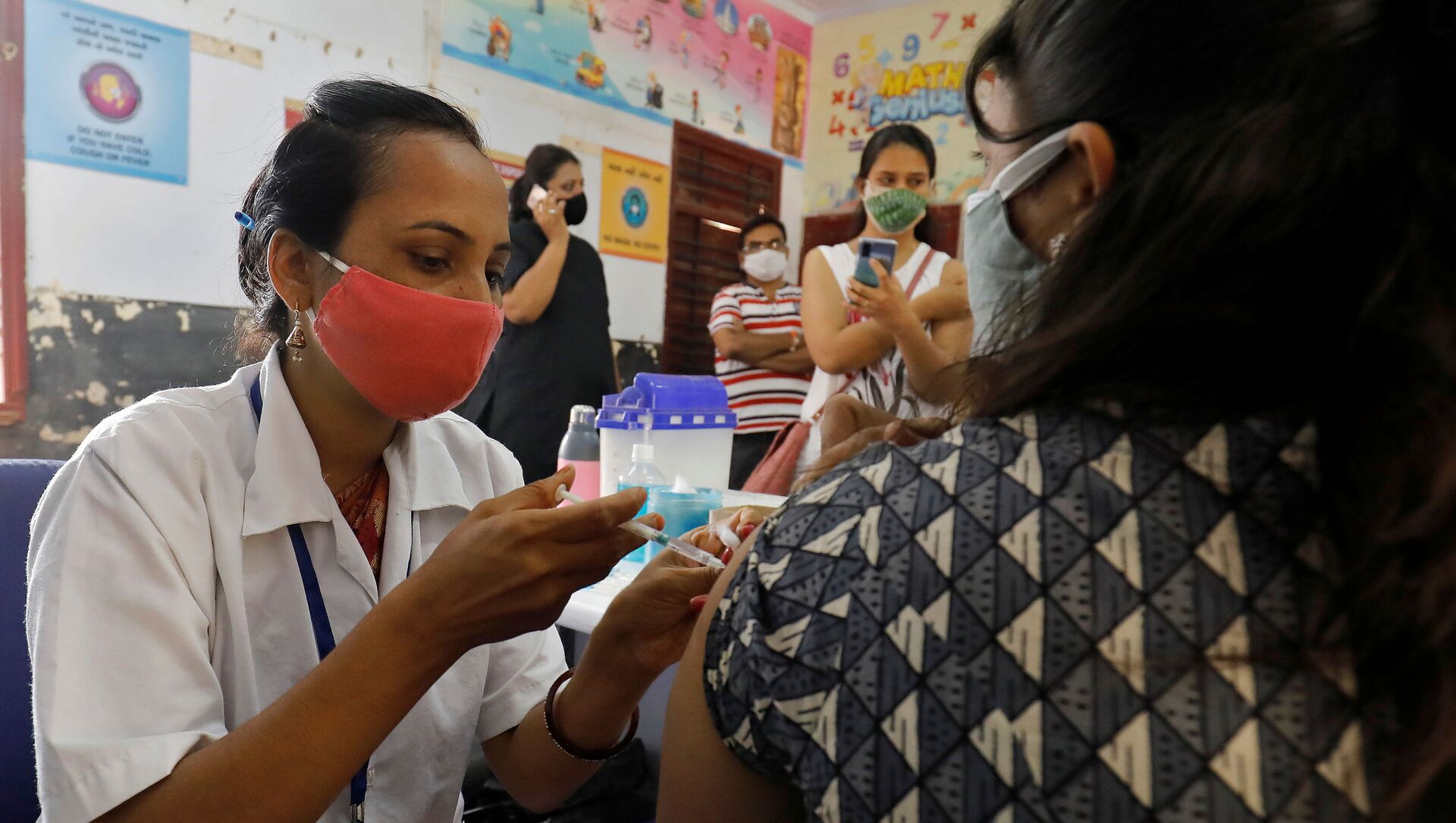https://sputnikglobe.com/20210710/lactating-women-should-get-vaccinated-against-covid-19-without-any-worry-top-indian-scientist-says-1083348716.html
Lactating Women Should Get Vaccinated Against COVID-19 Without Any Worry, Top Indian Scientist Says
Lactating Women Should Get Vaccinated Against COVID-19 Without Any Worry, Top Indian Scientist Says
Sputnik International
India witnessed a devastating second wave of coronavirus pandemic that has led to concerns over the possibility of a third wave. 10.07.2021, Sputnik International
2021-07-10T06:00+0000
2021-07-10T06:00+0000
2022-07-19T10:37+0000
newsfeed
world
covid-19
coronavirus
scientists
pregnancy
asia
opinion
interviews
https://cdn1.img.sputnikglobe.com/img/07e5/05/1b/1083006539_0:0:2950:1668_1920x0_80_0_0_e66baad981f474e6bd7d564aed972b26.jpg
Although the Indian Government approved COVID-19 vaccines for pregnant women in May this year, there are still doubts and fears among many segments of the population, especially lactating mothers. According to doctors, as pregnant and lactating women were not included in the later trials of the vaccines, there are concerns regarding their safety and efficacy.Sputnik reached out to Dr. Samiran Panda, head of the Division of Epidemiology and Communicable Diseases at the Indian Council for Medical Research (ICMR) to discuss vaccine hesitancy, the importance of vaccinating a lactating mother and pregnant woman, and a looming third wave, among other issues.Sputnik: There are a lot of reservations regarding vaccinating lactating and pregnant women. How do COVID-19 vaccines work in these women? Dr. Samiran Panda: Whenever vaccine development begins, it goes through a pre-clinical phase and a clinical phase. Once the Drugs Controller General of India (DCGI) approves, the vaccine candidate goes for a human trial, and for this, healthy young adults are chosen. The vulnerable group, which includes children and pregnant mothers and lactating mothers, is avoided during trials. The vaccines build antibodies and provide cellular responses. When a pregnant woman takes a vaccine, she passively transfers the antibodies to the child in the womb. These are called passively transferred maternal antibodies. Similarly, lactating mothers pass the antibodies through breast milk. So it is safe for both. The vaccinated pregnant women and lactating mothers are being closely monitored and so far, the results are motivating.Sputnik: Can these COVID-19 vaccines prevent the vertical transmission of SARS-CoV-2 from mother to fetus? Dr. Samiran Panda: Cases of vertical transmission are very few in the country. The passive transfer of maternal antibodies can take place for 18 months. The vaccination can reduce the severity of the infection. These vaccines are infection-preventive, disease-modifying vaccines. It's natural that a mother always tries to protect her baby. So biological mechanisms work in that order.Sputnik: There is a growing prevalence of vaccine hesitancy among the people of India. How can it be controlled?Dr. Samiran Panda: There is a need to enhance awareness among people to gain their trust and this hesitancy can happen due to societal, familial or political reasons. One or two isolated cases gone wrong should not be generalised and used as evidence against the vaccines. However, we need to be cautious when we are considering pregnant or lactating mothers as two lives are at stake. Sputnik: Recently, you suggested that the COVID-19 virus will reach its endemic stage like Influenza after a while. Do you think we can expect it to happen after a possible third wave? Dr. Samiran Panda: Any respiratory viral diseases like Influenza that happened 100 years ago also went through similar waves or phases. After several stages, it reaches the endemic state, which means the expected frequency of infection. We have done some excellent modelling work, and this data suggests that if a third wave comes, it will not cause large-scale damage like the second wave. However, if there is a combination of a viral variant that can escape the immunity with high transmissibility, the third wave may come early. Also, thanks to ramped up vaccination drives, there is a possibility that India can flatten the curve of infection.
https://sputnikglobe.com/20210707/science-not-speculation-scientists-blast-obsession-with-unsubstantiated-covid-lab-leak-theory-1083332732.html
https://sputnikglobe.com/20210120/hesitation-lack-of-awareness-behind-low-turnout-for-covid-vaccination-indian-medical-experts-1081810764.html
Sputnik International
feedback@sputniknews.com
+74956456601
MIA „Rosiya Segodnya“
2021
Sushmita Panda
https://cdn1.img.sputnikglobe.com/img/07e5/05/12/1082926186_0:0:2048:2048_100x100_80_0_0_4474d0d7e27a36878eb8727832be74b4.jpg
Sushmita Panda
https://cdn1.img.sputnikglobe.com/img/07e5/05/12/1082926186_0:0:2048:2048_100x100_80_0_0_4474d0d7e27a36878eb8727832be74b4.jpg
News
en_EN
Sputnik International
feedback@sputniknews.com
+74956456601
MIA „Rosiya Segodnya“
Sputnik International
feedback@sputniknews.com
+74956456601
MIA „Rosiya Segodnya“
Sushmita Panda
https://cdn1.img.sputnikglobe.com/img/07e5/05/12/1082926186_0:0:2048:2048_100x100_80_0_0_4474d0d7e27a36878eb8727832be74b4.jpg
newsfeed, covid-19, coronavirus, scientists, pregnancy, opinion, interviews
newsfeed, covid-19, coronavirus, scientists, pregnancy, opinion, interviews
Lactating Women Should Get Vaccinated Against COVID-19 Without Any Worry, Top Indian Scientist Says
06:00 GMT 10.07.2021 (Updated: 10:37 GMT 19.07.2022) India witnessed a devastating second wave of coronavirus pandemic that has led to concerns over the possibility of a third wave.
Although the Indian Government approved
COVID-19 vaccines for pregnant women in May this year, there are still doubts and fears among many segments of the population, especially lactating mothers. According to doctors, as pregnant and lactating women were not included in the later trials of the vaccines, there are concerns regarding their safety and efficacy.
Sputnik reached out to Dr. Samiran Panda, head of the Division of Epidemiology and Communicable Diseases at the Indian Council for Medical Research (ICMR) to discuss vaccine hesitancy, the importance of vaccinating a lactating mother and pregnant woman, and a looming third wave, among other issues.
Sputnik: There are a lot of reservations regarding vaccinating lactating and pregnant women. How do COVID-19 vaccines work in these women?
Dr. Samiran Panda: Whenever vaccine development begins, it goes through a pre-clinical phase and a clinical phase. Once the Drugs Controller General of India (DCGI) approves, the vaccine candidate goes for a human trial, and for this, healthy young adults are chosen. The vulnerable group, which includes children and pregnant mothers and lactating mothers, is avoided during trials. The vaccines build antibodies and provide cellular responses. When a pregnant woman takes a vaccine, she passively transfers the antibodies to the child in the womb. These are called passively transferred maternal antibodies. Similarly, lactating mothers pass the antibodies through breast milk. So it is safe for both. The vaccinated pregnant women and lactating mothers are being closely monitored and so far, the results are motivating.
Sputnik: Can these COVID-19 vaccines prevent the vertical transmission of SARS-CoV-2 from mother to fetus?
Dr. Samiran Panda: Cases of vertical transmission are very few in the country. The passive transfer of maternal antibodies can take place for 18 months. The vaccination can reduce the severity of the infection. These vaccines are infection-preventive, disease-modifying vaccines. It's natural that a mother always tries to protect her baby. So biological mechanisms work in that order.

20 January 2021, 04:15 GMT
Sputnik: There is a growing prevalence of vaccine hesitancy among the people of India. How can it be controlled?
Dr. Samiran Panda: There is a need to enhance awareness among people to gain their trust and this hesitancy can happen due to societal, familial or political reasons. One or two isolated cases gone wrong should not be generalised and used as evidence against the vaccines. However, we need to be cautious when we are considering pregnant or lactating mothers as two lives are at stake.
Sputnik: Recently, you suggested that the COVID-19 virus will reach its endemic stage like Influenza after a while. Do you think we can expect it to happen after a possible third wave?
Dr. Samiran Panda: Any respiratory viral diseases like Influenza that happened 100 years ago also went through similar waves or phases. After several stages, it reaches the endemic state, which means the expected frequency of infection. We have done some excellent modelling work, and this data suggests that if a third wave comes, it will not cause large-scale damage like the second wave. However, if there is a combination of a viral variant that can escape the immunity with high transmissibility, the
third wave may come early. Also, thanks to ramped up vaccination drives, there is a possibility that India can flatten the curve of infection.







